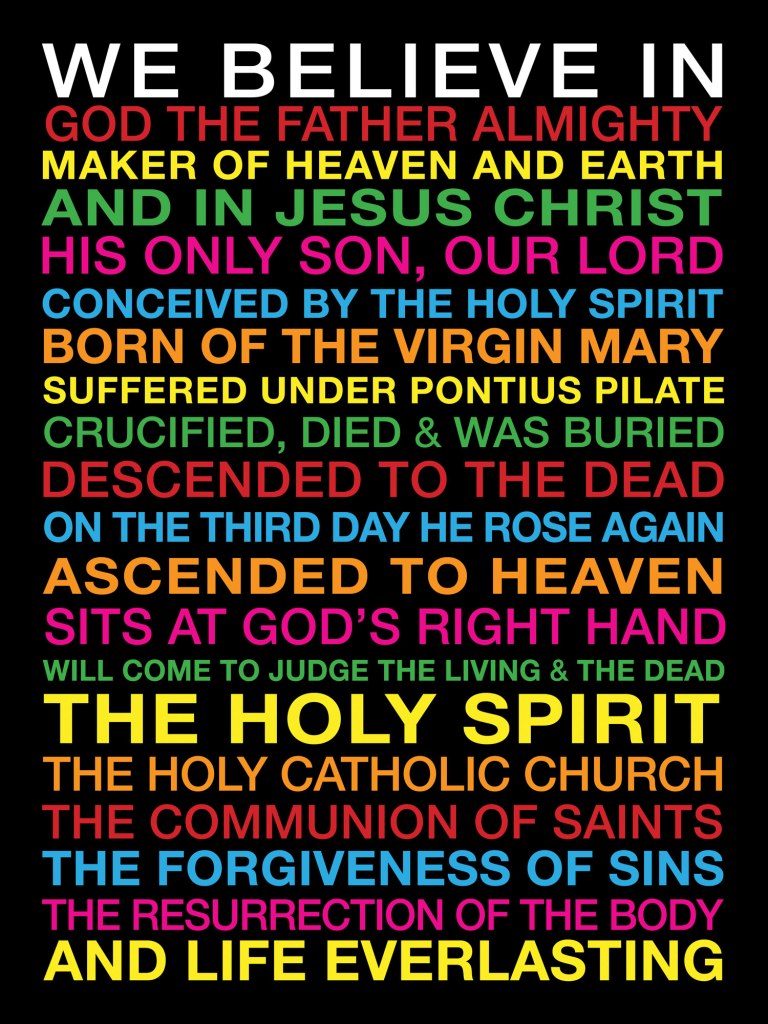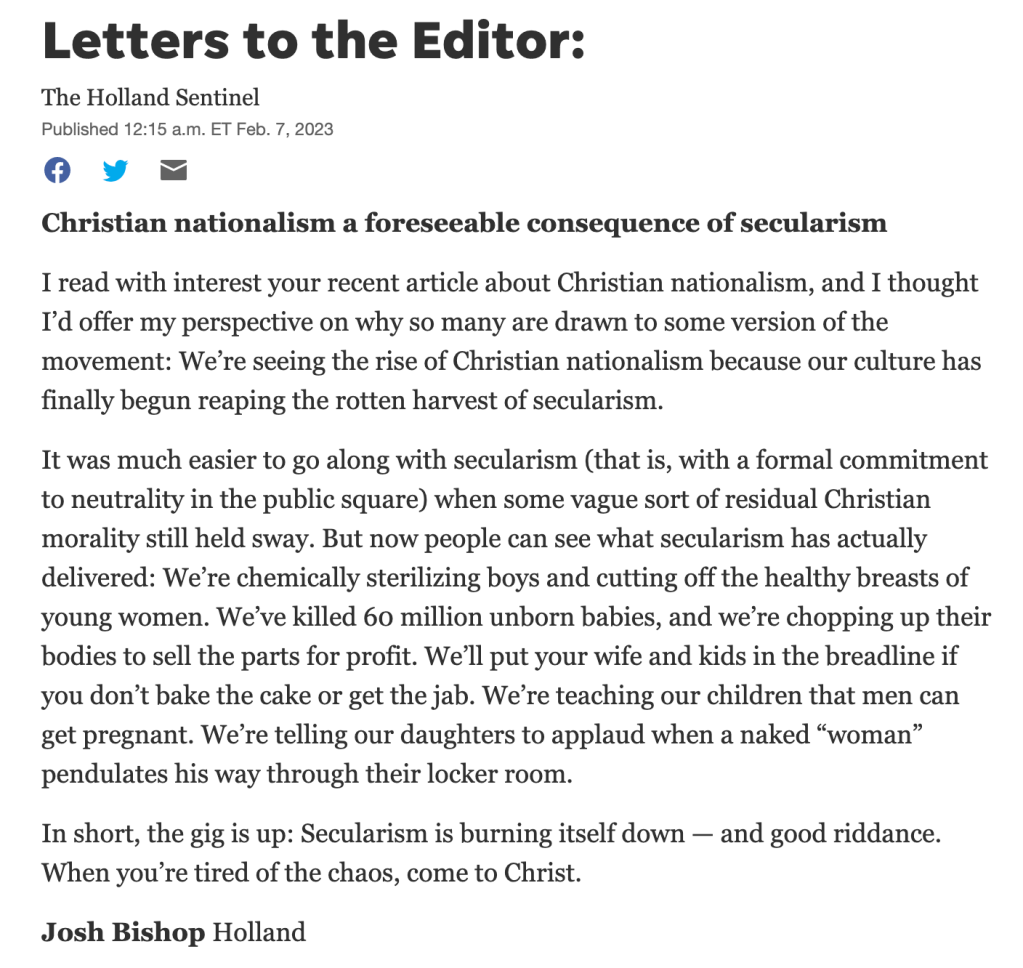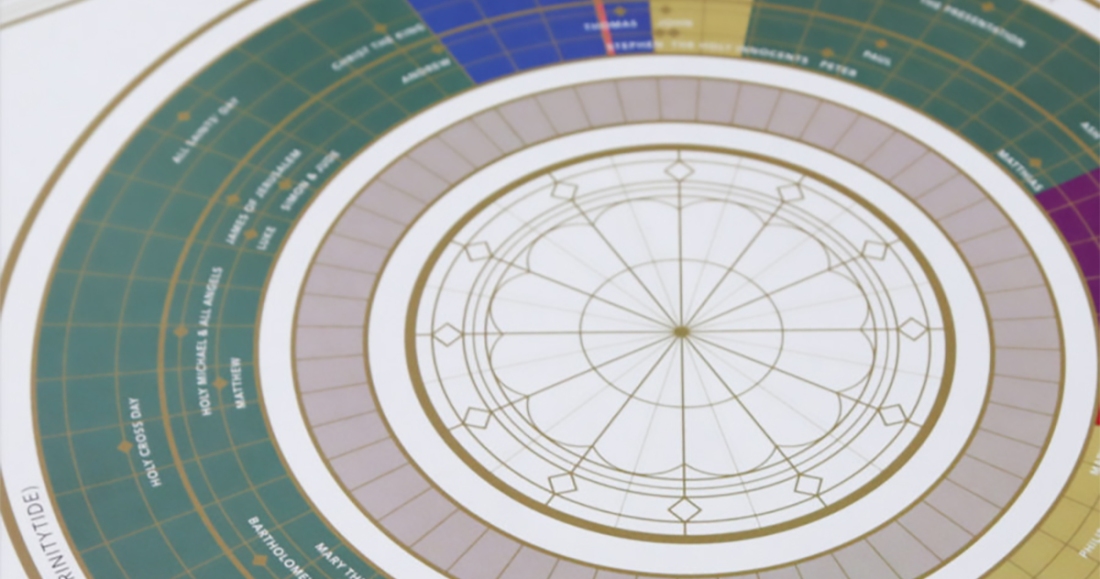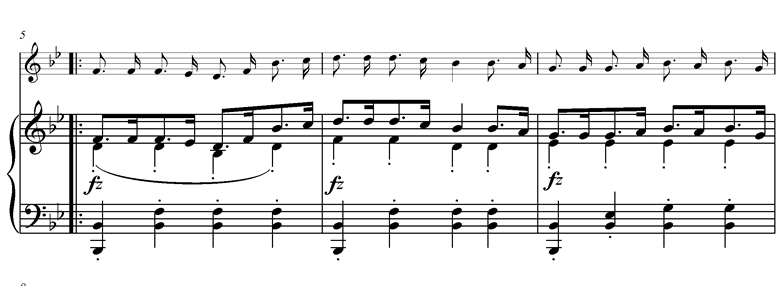First, the obvious: This post is not intended for my Anglican or Catholic or other high-church friends but for those who, like me, were raised in the low-church or nondenominational world of American evangelicalism, where the faith was once for all delivered to the saints by an orange puppet named Gerbert.
So, to make the title more precise, what follows is a plea to recover the church calendar in evangelical, nondenominational, and other low-church congregations.
AN INESCAPABLE CONCEPT
Ordering time is natural, and therefore inescapable. We are time-bound creatures, so the question is not whether we will order our time, but how we will order our time.
Nature presents the world to us in an orderly way. The world moves according to daily (sunrise, sunset), monthly (cycles of the moon), and annual (seasonal) rhythms. But it’s not just natural in the sense that nature does it; it’s also natural for man to structure his understanding of time in similar rhythms.
It’s not whether we follow a calendar, then, but which calendar we follow. Hasn’t your year so far been marked by New Year’s Eve, the Super Bowl, and March Madness? Do you follow the Hallmark calendar (Mother’s Day, Father’s Day, etc.)? The academic calendar (Spring Break, Summer Vacation, Back to School)? American holidays like Memorial Day, Independence Day, and Thanksgiving? A newfangled pop culture calendar that includes Mario Day (March 10 = Mar10 or MAR10), Pi Day (March 14 = 3.14), and Star Wars Day (May 4 = May the Fourth)?
In truth, we all pick and choose from these varied calendars, but the central point is that none of us gets to opt out of following a calendar. Remember: It’s not whether, but which.
JESUS IS LORD OF TIME
So, if it’s true that we inescapably order time, why would Christians not order it in a manner that commemorates the Lord of time?
J. Brandon Meeks wrote, “When Jesus died and rose again, he conquered sin and death — but he also conquered the calendar.” And so we recognize Jesus as the King of the Calendar when we structure our year according to the great work he has done in our redemption.
Although the magisterial Reformers jettisoned much of the liturgical calendar, Daniel Hyde pointed out that they “retained what they called the ‘evangelical feast days,’” which are those days that celebrate “the salvation which Christ had already accomplished for them in his Incarnation (Christmas), death (Good Friday), resurrection (Easter), ascending to the Father (Ascension), and giving of his Spirit (Pentecost).”
We see in Exodus 12:2 that the first thing God does when he frees his people from Egypt is to reorder the Israelites’ calendar: ”This month shall be for you the beginning of months. It shall be the first month of the year for you.” God reorders their sense of time, centering it around his redemptive work in the world. It seems appropriate, then, that when Jesus freed us from slavery to sin in the greater Exodus, we should reorder our own calendar, our own sense of time itself, around that historic event.
This church statement says it well:
“[W]e gladly encourage the celebration of the historic church calendar as a glorious testimony of the victory and rule of Christ over time. Rightly understood, His life celebrated and remembered in our days and weeks and months is a continuation of the triumph of Christ over the principalities and powers.”
CALENDARS TELL STORIES
“Calendars are not neutral,” wrote Andrew Wilson, “they narrate a particular vision of the world.” In contrast to the narratives told by the tax year, or the academic year, or the seasonal calendar year, “the Church calendar,” Wilson continues, “tells a different story again, one shaped by the gestation, birth, appearing, temptation, death, resurrection, ascension and gifts of the Lord Jesus. If you’re going to use a calendar at all, and most of us are, it might as well be one which holds together around the gospel.”
Matt Chandler picked up on this narrative theme in a video explaining why his church follows the church calendar:
“You and I, we are storied people,” Chandler said. “We live basically out of our gut and out of our heart, and those things are informed by stories.” He points to the consumerism and hedonism prevalent in our culture and says, “These are the stories of our day, and we want to counteract those stories or stand in opposition to those stories by living the story of Jesus.”
WE LIVE OUR CALENDAR’S STORY
Did you notice Chandler’s subtle shift from narrative and storytelling to story-living? It’s one thing to hear the story of Jesus, but it’s another thing altogether when we enter into and rehearse the story ourselves. “We want to experience as embodied souls the story of Jesus,” Chandler said, “and we believe that by doing this, it shapes and molds us as the people of God.”
Back to Andrew Wilson for an extended paragraph on how living the Christian calendar “shapes and molds us”:
The Church calendar does not just say things, it does things. When (as I do) you give something up for Lent, you find yourself pining for the resurrection. When you pray or study your way through Advent, you focus on the return of Christ in a sustained way that might well not happen if you didn’t. When you take Holy Saturday as a day of contemplation and quiet, you feel the silence and confusion and sheer weight of the period between crucifixion and resurrection, and notice the connections between that day and the rest of the Church age. When you baptise people on Easter Sunday, you enact new life at the same time as you celebrate it.
Can you see how the Christian calendar helps you practice — not just hear — the Christian story? We aren’t just told the story; we live it. And as we live it, we are being shaped by it.
A TOOL TO BUILD THE NEW CHRISTENDOM
We are in a battle over time itself, and the enemies of the church know this better than we do.
“Cultural dominance requires two things,” wrote Carl Trueman: “control of time and space.”
If we understand that restructuring a culture’s time is a means of asserting cultural dominance, then we can begin to understand why contemporary battles over the calendar have become so important. That’s why we have Pride Month now; it’s why Columbus Day is disappearing for an ascendant Indigenous Peoples Day. This is why we’ve replaced BC (Before Christ) and AD (Anno Domini, the year of our Lord) with BCE (Before Common Era) and CE (Common Era). These shifts in our calendars are really the pursuit of secular cultural dominance.
Christians had that cultural dominance once: “Liturgical calendars developed in the fourth century and beyond, as Christianity came to dominate the empire,” Trueman wrote. In this first Christendom, controlling time “was achieved through developing a calendar which gave the rhythm of time a specifically Christian idiom.”
It follows, then, that if we want to build the New Christendom (and we do), then reclaiming the church calendar is one critical way to do so.
‘NOT HOLY BUT HELPFUL’
None of this is to say that the church calendar should be required, only that it is, in the words of Daniel Hyde, “not holy but helpful.”
There are more reasons than those above that the church calendar is helpful, including:
- It is a reminder of the historical nature of our faith — the Christian claims happened at particular times in history
- It unites us to the universal, catholic church through shared practices
- It demonstrates a respect for Christian tradition
- It provides a structure for disciplined times of feasting and fasting
Hopefully, some of you have been convinced by my plea — my invitation — to step into the benefits of ordering your time according to the Christian story. I’m not trying to implement a mandate here. But whether you’re convinced or not, either way, remember to extend grace to those who decide otherwise:
“One person esteems one day as better than another, while another esteems all days alike. Each one should be fully convinced in his own mind” (Romans 14:5).
WHAT THIS RECOVERY MIGHT LOOK LIKE
A few quick, closing thoughts:
Recovery in the Church
Again, remember that the question isn’t whether your church follows a calendar, but which calendar it follows. In many (most?) parts of evangelicalism, Mother’s Day, Father’s Day, Super Bowl Sunday, and Spring Break are more likely to get a mention from the pulpit or programming than are Epiphany, Pentecost, Trinity Sunday, or Ascension Sunday.
As a baseline, I’d like to see every single church reclaim and celebrate the five evangelical feast days of Christmas, Good Friday, Easter, Ascension, and Pentecost. Almost every church already celebrates Christmas and Easter, and many or most mark Good Friday, so we really only need to do the heavy lifting on Ascension and Pentecost.
The other days surrounding this can be practiced according to conscience or tradition, including Advent, Ash Wednesday, and Lent (not to mention the numerous other days of feasting, fasting, and commemoration in various liturgical calendars).
Recovery in Your Personal Life
If you’re personally convinced of the benefits of the church calendar, you can mark the days yourself, even if your church doesn’t. Simply find a church calendar (I use and recommend the Anglican one) and begin paying attention to it.
A lot of this will be unfamiliar at first. Start small — stick with the big ones, like the five evangelical feasts or some of the others (Ash Wednesday, Maundy Thursday, Christ the King). Don’t worry about what Whitsunday means or which days are Days of Rogation or whether to fast on Ember Days. Start with the basics and add as you go.
You can also work to structure your life according to seasons of feasting and fasting — whether you do this with or without the church calendar, these disciplines are both biblical and good for you.
A quick note on saints’ days or feast days:
I used to be uncomfortable with saints’ days, but the truth is, I already commemorate people all the time. My personal calendar is full of birthday reminders for my friends and family members, and as I grow older, it’s beginning to fill with days remembering my friends’ and family members’ deaths. For a long time, I’ve noted the births and deaths of authors or public figures I’d like to remember (e.g., C.S. Lewis, Jonathan Edwards, John Bunyan, P.G. Wodehouse). I even mark the birthdays of some fictional characters.
Fictional characters notwithstanding, it is normal and human and good to remember these things — so we should do so. And if we’re going to commemorate our friends and family, why would we not also commemorate our fathers and mothers in the faith? One helpful tool for me has been Our Church Speaks.
Recovery in the Culture
As I said earlier, one reason we lost the culture is that we lost the calendar. And one way to win the culture back is to reclaim the calendar — which is to say, reclaim time itself — in the name of Jesus. But we can’t give the world something we don’t have. Start in the church and your own life, then look to the culture.
We can look for ways to re-Christianize the major cultural holidays that come from the church: Christmas, Halloween, Valentine’s Day, St. Patrick’s Day. But we can also begin to publicly celebrate the rest of the church calendar as a means of reasserting a peculiarly Christian culture.
Think of the way that restaurants in certain regions still have Fish Fry Fridays during Lent, or whose businesses still close on Sundays — this thoroughly secular sphere has responded to the cultural demands of Christians who follow the church calendar. We want more of this, and we want it on many more church holidays. Our goal here should be to aim for a critical mass of Christians, such that the culture notices and begins to change in response.











